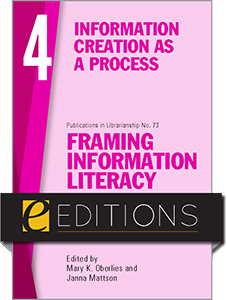
Framing Information Literacy (PIL#73), Volume 4: Information Creation as a Process—eEditions PDF e-book
The download link for this product can be found on the final confirmation screen after you complete your purchase, and may also be accessed from your Account Profile. For more information about ALA eEditions file types and how to view them on eReaders, desktop computers, and other devices, see this page.
Primary tabs
You don't need to be an ALA Member to purchase from the ALA Store, but you'll be asked to create an online account/profile during the checkout to proceed. This Web Account is for both Members and non-Members.
If you are Tax-Exempt, please verify that your account is currently set up as exempt before placing your order, as our new fulfillment center will need current documentation. Learn how to verify here.
- Description
- Table of Contents
- About the authors
Information Creation as a Process
Information in any format is produced to convey a message and is shared via a selected delivery method. The iterative processes of researching, creating, revising, and disseminating information vary, and the resulting product reflects these differences.
Many librarians struggle with the best methods, activities, and practices for teaching information literacy. Developing learning outcomes and activities, overcoming student and faculty apathy toward information literacy instruction, and meeting instructional and institutional goals can be difficult if you’re feeling overwhelmed with instructional jargon, or uncertain in your teaching due to no formal training.
Framing Information Literacy: Teaching Grounded in Theory, Pedagogy, and Practice is a collection of lesson plans grounded in theory and the ACRL Framework for Information Literacy for Higher Education. 52 chapters over six volumes provide approachable explanations of the ACRL Frames, various learning theory, pedagogy, and instructional strategies, and how they are used to inform the development of information literacy lesson plans and learning activities. Each volume explores one frame, in which chapters are grouped by broad disciplinary focus: social sciences, arts and humanities, science and engineering, and multidisciplinary. Every chapter starts with a discussion about how the author(s) created the lesson, any partnerships they nurtured, and an explanation of the frame and methodology and how it relates to the development of the lesson, and provides information about technology needs, pre-instruction work, learning outcomes, essential and optional learning activities, how the lesson can be modified to accommodate different classroom setups and time frames, and assessment.
The six volumes of Framing Information Literacy aim to address the teaching anxiety and insecurity librarians often experience by offering narratives with the lesson plans that provide insight into the work involved in developing a polished lesson plan; begin filling the teaching and learning knowledge gap for librarians in the context of information literacy, capturing the knowledge and practice of fifty-eight teacher librarians and five teaching faculty from forty-one institutions for others to incorporate and build upon; and to explore how teacher librarians use the ACRL Framework in conjunction with educational theory and pedagogy to help readers form their own approaches to teaching information literacy.
Each volume contains the table of contents and index for the entire set, as well as an overarching introduction and conclusion, for easy cross-referencing across volumes. Explore your favorite frame, or collect them all!
Acknowledgements
Introduction
Mary K. Oberlies and Janna Mattson, MLS
Volume 4. Information Creation as a Process
Chapter 27. What is an Annotated Bibliography and WHY Should I Do One?
Jolanda-Pieta van Arnhem and Jannette L. Finch, College of Charleston
Chapter 28. Taming the Wild Ones: Leveraging Social Learning for Information Literacy
Maoria J. Kirker, George Mason University
Chapter 29. Declaring Independence: Scaffolding IL Skills Through Final Research Projects
Victoria Elmwood, Loyola University New Orleans
Chapter 30. Transformative Learning: Changing ESL Students’ Research Methods through the Examination of the Processes of Information Creation
Amanda B. Albert, Washington University in St. Louis
Chapter 31. Finding Empirical Articles for Psychology
Allison Faix, Coastal Carolina University
Chapter 32. Helping Civil Engineering Students to Meet Real-World Information Needs
Theresa Calcagno, George Mason University
Chapter 33. Beyond “Is it Peer-Reviewed?”: Exploring Information Creation in the Sciences
Nicole Juve and Beth Twomey, North Dakota State University
Conclusion
Index
Mary K. Oberlies
Mary K. Oberlies is the Undergraduate Engagement Librarian and Assistant Librarian at the University of Oregon. She received her MAIS from the University of Missouri-Columbia, an MA in Violence, Terrorism, and Security from Queen's University at Belfast, and a BA in International Studies from Berry College.
Janna Mattson
Janna Mattson is the Instructional and Social Sciences Librarian at George Mason University. She received her MEd from George Mason University along with a graduate certificate in eLearning, an MLS from Queens College, City University of New York, and a BA in Music from Virginia Commonwealth University.


